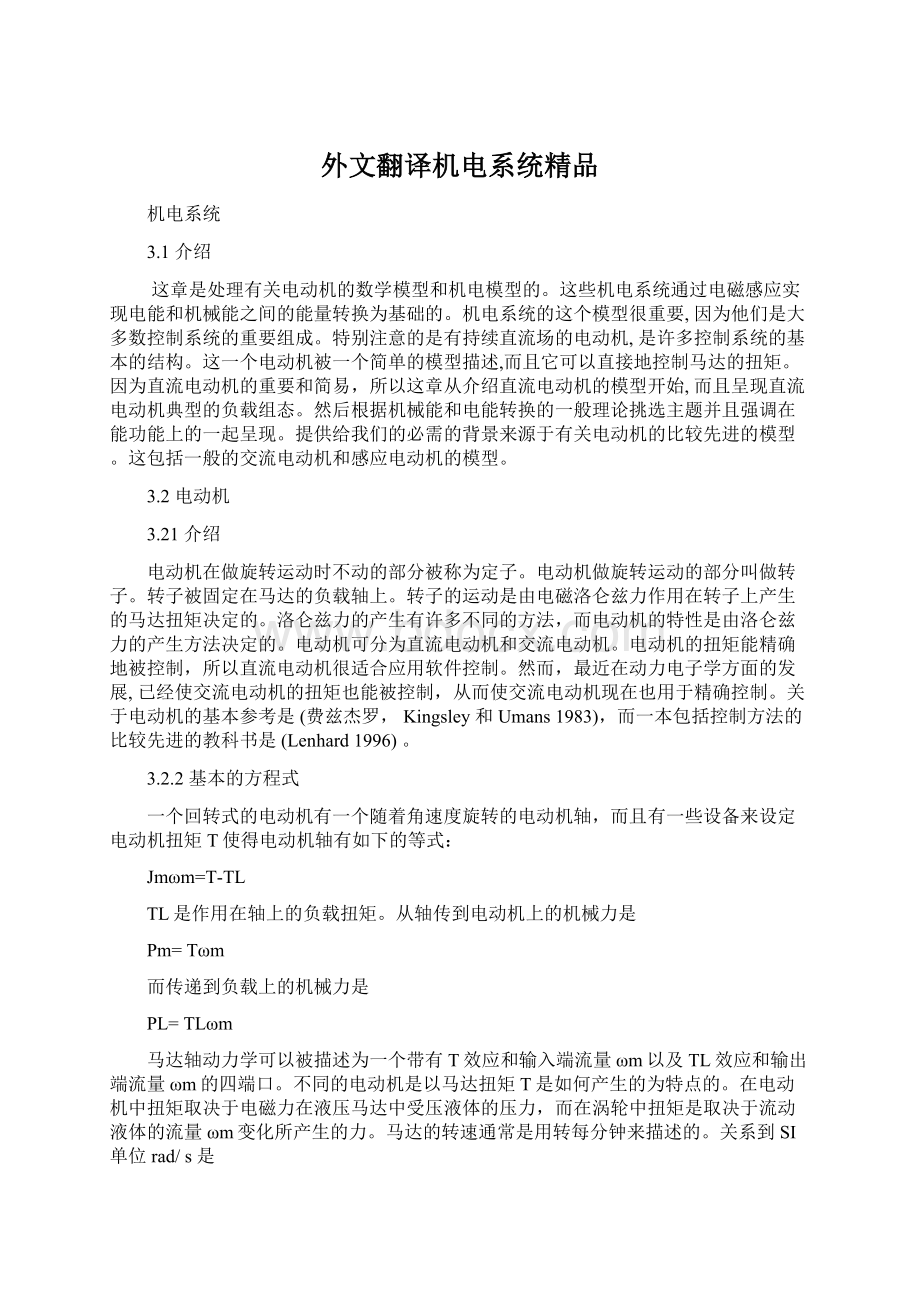外文翻译机电系统精品Word格式文档下载.docx
《外文翻译机电系统精品Word格式文档下载.docx》由会员分享,可在线阅读,更多相关《外文翻译机电系统精品Word格式文档下载.docx(14页珍藏版)》请在冰豆网上搜索。

电动机可分为直流电动机和交流电动机。
电动机的扭矩能精确地被控制,所以直流电动机很适合应用软件控制。
然而,最近在动力电子学方面的发展,已经使交流电动机的扭矩也能被控制,从而使交流电动机现在也用于精确控制。
关于电动机的基本参考是(费兹杰罗,Kingsley和Umans1983),而一本包括控制方法的比较先进的教科书是(Lenhard1996)。
3.2.2基本的方程式
一个回转式的电动机有一个随着角速度旋转的电动机轴,而且有一些设备来设定电动机扭矩T使得电动机轴有如下的等式:
Jmωm=T-TL
TL是作用在轴上的负载扭矩。
从轴传到电动机上的机械力是
Pm=Tωm
而传递到负载上的机械力是
PL=TLωm
马达轴动力学可以被描述为一个带有T效应和输入端流量ωm以及TL效应和输出端流量ωm的四端口。
不同的电动机是以马达扭矩T是如何产生的为特点的。
在电动机中扭矩取决于电磁力在液压马达中受压液体的压力,而在涡轮中扭矩是取决于流动液体的流量ωm变化所产生的力。
马达的转速通常是用转每分钟来描述的。
关系到SI单位rad/s是
3.2.3传动机构模型
一个电动机通常的转速是从0到每分钟3000转。
专门设计的电动机可以达到每分钟12000转。
和这个相比教,汽车引擎一般是每分钟800-6000转。
对于许多应用方面来讲,负载所要求的速度是低于马达的转速的,而且必须还要设置一个减速箱。
这就使得负载可以有一个相对较低的转速,更重要的是,它提供了一个更高的扭矩。
带有传动定额n(图3.1)的一个减速装置可以被描述为
ωout=nωin
Tin是作用在这个装置的输入端的轴的角速度,Tout是作用在装置输出端的轴的角速度。
对于n<
1的减速装置,而且装置的额定配额是10的话,则n=1/10。
输入扭矩和输出扭矩的关系可以通过比较这个装置的输入动力和输出动力来得出。
假设这是一个无损耗的装置,那么输入的动力就应该等于输出的动力
Tinωin=Toutωout
带入ωout的表达式,我们得出
Tout=
Tin
这也就是说一个减速装置可以使速度减少到原来的1/10,而扭矩被放大到原扭矩的10倍。
一个带有比率n的减速装置可以被描述为一个作用在输入端的变量Tin和变量ωin以及作用在输出端的变量Tout和变量ωout的二端对
Tout=
3.2.4电动机和传动机构
例如一个带有如下等式的电动机,
这个电动机通过一个比率为n的减速装置来驱动一个负载。
可以得出负载轴的角速度为ωL=nωm,通过减速装置的输出扭矩TL/n来驱动。
负载的惯性量是JL,假设作用在负载上的外部扭矩为T,则计算负载的运动方式的等式为
JLωL=
TL-Te
如果负载方程式(3.11)被n乘并且加到电动机(3.10)的方程式,那么得出的就是马达系统的运动方式的等式。
相应的,电动机的等式可以除以n然后加到负载等式上。
这将会得出负载系统的运动方式等式。
总结:
电动机,传动机构和马达的负载的方程式是
(Jm+n2JL)
m=T-nTe
电动机,传动机构和负载边的负载的方程式是
[(1/n2)Jm+JL]
L=
T-Te
3.25对平移的旋转装置的变换
ωm,TL
Fe
m
v
从旋转装置到平移的图3.3传动
一个轴的回转运动能被转换到平面移动,反之亦然,在如图3.3所显示的一个表面上装上一个转动的轮.这种传动在平板-齿轮传动、虚拟传动装置、滑轮以及在车轮和路面之间经常可见。
假如轮子的半径为r,轴的转速为ωm,扭矩为T,然后平移的速度将会是v=rωm。
记作用在传动部分的力为F,则输入动力为ωmTL,输出动力为v。
由于这个装置并不储存能量,然后可以得出f=t/t。
这就表示:
从转动到平移的转换可以被描述为一个四端口。
这个端口带有作用在输入端的变量TL和ωm及作用在输出端的变量F和v。
v=rωm
考虑一个通过半径为r的轮子来驱动一个在做平移运动的物块。
假定负载的运动方程式为
=F-Fe
f是作用在负载上面的一个外力。
电动机的方程式为
Jm
mωm=T-TL
电动机和马达的负载的方程式是
(Jm+mr2)
m=T-rFe
电动机和负载边的负载方程式是
[(1/r2)Jm+m]
=
T-Fe
3.26扭矩特性
1
TL
2
ωmωm
图3.4:
左图所示为在一个稳定的系统中由于增加的发动机速率Wm而增加的负载扭矩TL。
右图所示为一个系统中的两个平衡点。
平衡点1是稳定的而平衡点2是不稳定的,因为当发动机转速增加的时候负载扭矩比发动机扭矩降低的块。
在许多应用中负载扭矩将会取决于马达的速度。
在图3.4的左边线图中显示了这样一个例子,负载扭矩随着速度的增加而增加的地方,就是当速度增加摩擦力也增加的地方,就好像汽车和自行车空气阻力一样。
而且,由于在发动机中的能量的损失的增加,发动机扭矩是马达轴转速降低的一个原因。
则可以得出,如果发动机扭矩和负载扭矩都可以影响马达的转速,那么T=T(ωm)和TL=TL(ωm),则马达和负载的稳定性可以通过扭矩-速度表来研究。
通过马达模型的线性化研究(3.1),则可以得出:
Jm
m=k
m
在这
是一个线性化常数。
从线性稳定性理论我们可以得出当且仅当k小于等于0时,系统才稳定。
这可以通过在如图3.4所显示的一个扭矩-速度的线图来研究。
摩擦力被定义为
TL(ωm)={Te+(Ts-Te)exp[-(
)2]}sgn(ωm)+Bωm
在这里t代表库仑摩擦力而Ts代表了静摩擦力
sgn(ωm)=
(ωm<
0,-1ωm>
0,1)
常量ωm是Stribeck效应的特征速度而B是黏性摩擦系数。
对于这个摩擦特点的更细节的研究,见第5章.马达的扭矩可以直接控制,因此t是一个常量。
运动方式的等式是
Jmωm=T-{Te+(Ts-Te)exp[-(
)2]}sgn(ωm)-Bωm
为了简便假设w>
0因此sgn(Wm)=1
m=(2
(Ts-Te)exp[-(
)2]-B)
这表示如果速度Wm
B<
2
)2]
系统对于常量马达扭矩T是不稳定的。
electromechanicalsystems
3.1introduction
Thischapterdealswithmathematicalmodelsofelectricalmotors,andmodelsofelectromechanical.Theseelectromechanicalsystemsarebasedonenergyconversionbetweenelectricalandmechanicalenergyduetothecapacitiveandinductiveeffects.Thistypeofelectromechanicalsystemsareimportant,astheyarevitalcomponentinmostcontrolsystems.SpecialattentionisgiventotheDCmotorwithconstantfield,whichisabasicbuildingblockinmanycontrolsystems.Thismotorisdescribedbyasimplemodel.,anditispossibletocontrolthemotortorquedirectly.BecauseofitsimportanceandsimplicitythechapterstartswiththemodelofaDCmotor,andpresentstypicalloadconfigurationforDCmotor.Thenselectedtopicsfromthegeneraltheoryofelectromechanicalenergyconversionispresentedwithemphasisonenergyfunctions.Thisprovidesuswiththenecessarybackgroundtoderivemoreadvancedmodelsofelectricalmotors.ThisincludesthemodelsofageneralACmotor,andmodelsforinductionmotors.
3.2Electricalmotors
3.21Introduction
Anelectricalmotorwithrotarymotionhasastationarypartcalledthestator.therotarypartofthemotoriscalledtherotor.Therotorisfixedtothemotorshaftwhichdrivestheload.ThemotionoftherotorisduetothemotortorquewhichissetupbyelectromagneticLorentzforcesactingontherotor.TherearemanydifferentwaysofsettingupanappropriateLorentzforce,andelectricalmotorsarecharacterizeddependingonhowthisisdone.ElectricalmotorsaredividedintoDCmotorsandACmotors.DCmotorsarewellsuitedforcontrolapplications,asthetorqueofthemotorcanbeaccuratelycontrolled.Therecentdevelopmentinpowerelectronics,however,hasmadeitpossibletocontrolthetorquealsoforACmotors,and,consequently,ACmotorsarenowusedforaccuratecontrol.Abasicreferenceonelectricalmotorsis(Fitzgerald,KingsleyandUmans1983),whileamoreadnancedtextbookincludingcontrolmethodsis(Lenhard1996).
3.2.2Basicequations
arotarymotorhasamotorshaftthatrotateswithangularvelocity,andithassomedeviceforsettingupamotortorqueTsothatthemotorshafthasthefollowingequationofmotion:
Jmωm=T-TL
HereTListheLoadtorqueactingontheshaft.Themechanicalpowerdeliveredfromthemotortotheshaftis
whilethemechanicalpowerdeliveredtotheloadis
Themotorshaftdynamicscanbedescribedasatwo-portwitheffortTandflowωmattheinputport,andeffortTandflowωmattheoutputport.DifferenttypesofmotorsarecharacterizedaccordingtohowthemotortorqueTisgenerated.Inelectricalmotorsthetorqueisduetoelectromagneticforces,inahydraulicmotorofthehydrostatictypeitisduetothepressureforcefromapressurizedfluid,whileinaturbinethetorqueissetupbytheforcesthatresultfromthechangeofmomentumintheflowingfluid.
Thespeedofamotoriscommonlygiveninrevolutionsperminute(rev/min).TherelationtotheSIunitrad/sis
3.2.3Gearmodel
Anelectricalmotorwilltypicallyhaveaspeedrangefromzerouptoabout3000rev/min.Speciallydesignedelectricalmotorsmayrunupto12000rev/min.Incomparisontothis,carenginesrunfrom800-6000rev/min.Formanyapplicationstherequiredspeedrangeoftheloadissignificantlylessthanthespeedrangeofthemotor,andareductiongearmustbeused.Thisgivesalowerspeedoftheload,and,moreimportantly,itgivesahighertorque.
Areductiongearwithgearrationn(Figure3.1)isdescribedby
whereωinistheangularvelocityoftheshaftontheinputsideofgear,andωoutistheangularvelocityoftheshaftontheoutputsideofthegear.Forareductiongearn<
1,andagearissaidtohaveagearrationof,say,10ifn=1/10.
therelationbetweentheinputtorqueTinandtheoutputToutisfoundbycomparingpowerinandpoweroutforthegear.Supposethatthegearislossless.Thenpowerinisequaltopowerout,thatis,
Insertingtheexpressionforωoutwefindthat
Tout=
Thismeansthatareductiongearreducesthespeedbyafactorn,whileitamplifiesthetorquebyafactor1/n.
Agearwithgearrationmaybedescribedasatwo-port
ωout=nωin
withvariablesTinandωinattheinputport,andvariablesToutandωoutattheoutputport.
3.2.4Motorandgear
Consideramotorwithequationofmotion
thatdrivesaloadoverareductiongearwithgearration(Figure3.2).ThentheloadhasashaftspeedωL=nωmn,andisdrivenbytheoutputtorqueofthegear,whichisTL/n.TheinertiaoftheloadisJL,anditisassumedthatanextemaltorqueTactsontheload.Thentheequationofmotionfortheloadis
Iftheloadequation(3.11)ismultipliedbynandaddedtotheequationofthemotor(3.10),thentheresultistheequationofmotionforthesystemreferredtothemotorside.Alternatively,themotorequation(3.10)canbedividedbynandaddedtotheloadequation(3.11).Thiswillgivetheequationofmotionofthesystemreferredtotheloadside.Tosumup:
Theequationofmotor,gearandloadreferredtothemotorsideis
(Jm+n2JL)
Theequationofmotionformotor,gearandloadreferredtotheloadsideis
3.25transformationofrotationtotranslation
Figure3.3Transmissionfromrotationtotranslation
RotationalmotionofashaftcanbetransformedtotranslationmotionandviceversabymountingawheelthatrollsonasurfaceasshowninFigure3.3.Thistypeoftransmissioniscommonlyseeninrack-and–piniondrivers,fictiongears,pulleys,andbetweencarwheelsandtheroad.Supposethatthewheelhasradiusr,shaftspeedωm,andtorqueTL.Thenthetranslationalvelocitywillbev=rωm.DenotetheforceactingformthewheelonthetranslatingpartbyF.ThentheinputpowerwillbeωmTLandtheoutputpowerwillbev.Thegeardosenotstoreenergy,anditfollowsthatf=t/t.Thisshowsthat:
Amotiontotranslationtransmissioncanbedescribedbuythetwo-port
v=rωm
WithvariablesTLandωmattheinputport,andvariablesFandvattheoutputport.
Consideramotorwhichdrivesamassintranslationalmotionoverawheelwithradiusr.Theloadisassumedtohaveequationofmotion
m
Wherefisanexternalforceactingontheload.Amotordescribedby
Theequationofmotionformotorandloadreferredtothemotorsideis
Theequationofmotion